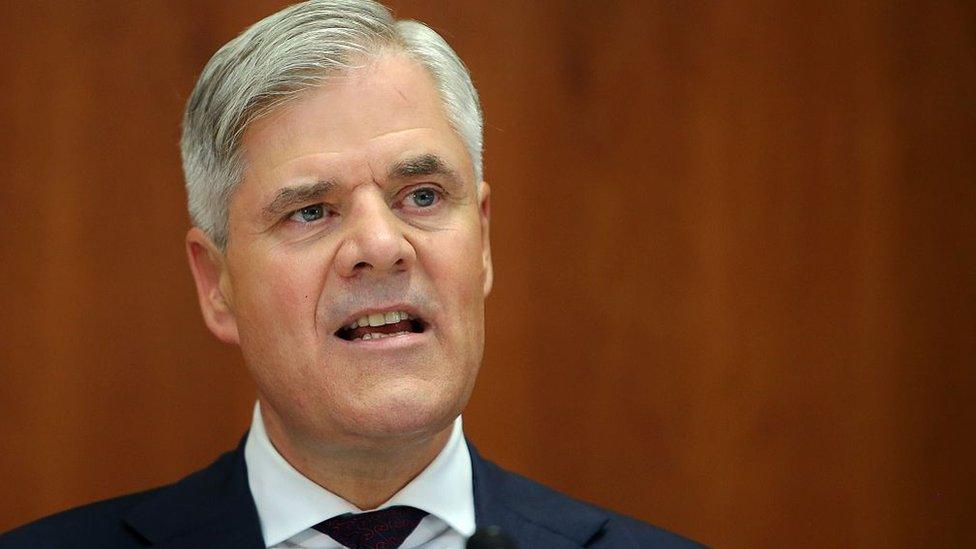Germany's Bundesbank plays down Brexit 'punishment'
- Published
- comments

One of Germany's most senior banking executives has said the vote to leave the European Union should not be taken as an excuse to "penalise" the City.
Dr Andreas Dombret, executive board member for the German central bank, the Bundesbank, said that the approach to Brexit should be "pragmatic".
Although he said some jobs could be lost, London would remain "the most important financial centre in Europe".
"As there has been this vote, there will be a Brexit," he told the BBC.
"I see it as my job to make sure the transition is as smooth as possible, and we, I can promise, will be as pragmatic as possible."
Dr Dombret said he did not believe that Brexit was risk free.
In a private meeting in Frankfurt earlier this month, he said that London's position as the financial services "gateway" to the EU could be undermined.
Further, trillions of pounds worth of euro currency transactions and insurance products - called clearing - would be likely to move to the continent from the City.

Andreas Dombret, of the Bundesbank, says the Brexit negotiations will be a "two way street"
But he made it clear that Germany saw Britain as an ally, particularly when it came to maintaining global regulatory standards.
Dr Dombret said he did not want to see either the EU or the UK engaged in a "regulatory rush to the bottom" to try and gain competitive advantage.
And he admitted that any risks to financial services were "two-way".
"I see risks not only for London; I see risks for Germany and for the rest of Europe, should there be an impact of Brexit on economic circumstances it will not be concentrated on Great Britain it will be also in the rest of Europe," he said.
"I see this as a two-way street. Of course there will be costs to such a development, but it is far too early to say what these costs will be and what kind of unintended costs we will have to face."
Asked how many jobs might relocate in the financial services sector after Britain has left the EU, Mr Dombret answered: "It is very hard to put a number on it.
"They may not all necessarily go to Europe, maybe some of those job losses could go to the United States.
"I am not expecting those job losses from the UK point of view all to go to one city.
"[That] is also not that bad because then the risk is also diversified over several financial centres, I see some benefit in that too from a financial stability point of view."
'No sense'
Turning to the chances of a free trade deal for financial services between the UK and the EU, Dr Dombret admitted that there were a number of hurdles.
"I don't have 100% confidence this will work," he said, pointing out that the EU had never signed a free trade deal for financial services with a non-EU country.
"You have to have some scepticism. But, again, I know the government of the United Kingdom is very sincerely trying to negotiate this and we should be open, especially from the German point of view, to the EU 27, to everything in order to help Great Britain.
"By no means does it make sense to penalise the United Kingdom for having taken this view [Brexit]."

Mr Dombret says a number of banks have contacted Frankfurt about moving some services from London
The Bundesbank has recently put information on its website for banks looking to move jobs to Frankfurt, the country's financial capital.
"This is only logical, if you as a bank are thinking of relocating part of your business to a city like Frankfurt, that you speak to potential future supervisors," Dr Dombret said.
"That is the most logical thing to do.
"So, I am not promoting Frankfurt as a financial centre, but of course I am willing to answer all questions and willing to entertain all meetings because it is only good for the stability of the financial system that there is as much transparency as possible and that all questions are being answered.
"It is just a service because so many banks are contacting us."